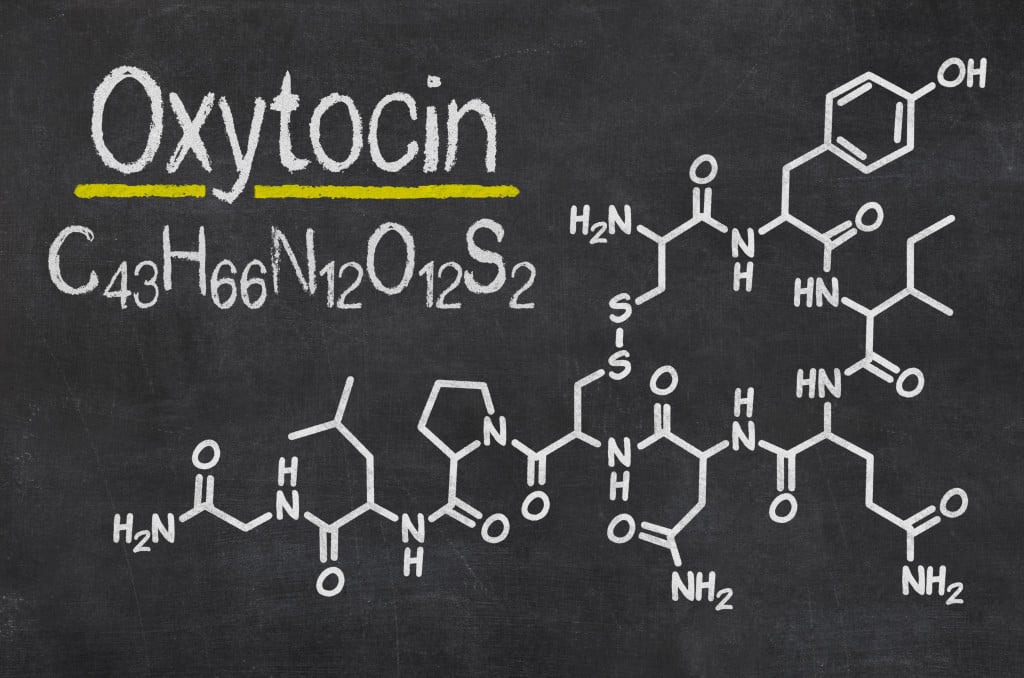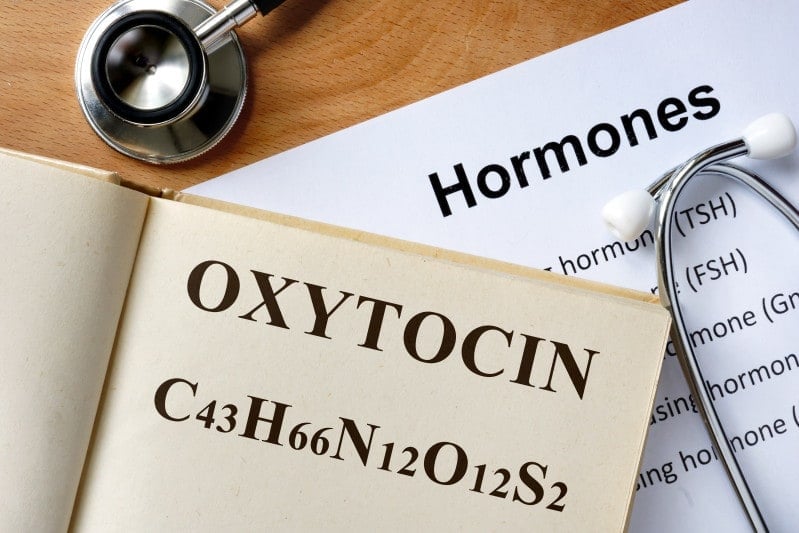Oxytocin… it's not just about sex! The pituitary is a very important gland located at the base of the brain, just below the hypothalamus. The two main sections of the gland, the anterior and posterior pituitary secrete some very essential hormones for life….
Anterior Pituitary Hormones
- ACTH (Adrenocorticotrophic Hormone) – stimulates adrenal gland to produce cortisol
- FSH (Follicle Stimulating Hormone) and LH (Luteinizing Hormone)- control sexual characteristics and reproductive functioning, known as gonadotrophins.
- TSH (Thyroid Stimulating Hormone) – stimulates thyroid gland to release thyroid hormone
- Prolactin – stimulates breast to produce milk for lactation
- MSH (Melanocyte Stimulating Hormone) – deficiency can increase pain, inflammation and sleeping issues.
- GH (Growth Hormone) – stimulates growth and repair
Posterior Pituitary Hormones
- ADH (Antidiuretic Hormone) – controls blood fluid and mineral levels along with hydration
- Oxytocin – more below about the many functions of oxytocin…
Oxytocin…. it's not just about sex!
The hormone oxytocin is often referred to as the neuropeptide of “love and attachment”. Perhaps the least understood of the pituitary hormones, it has been linked to maternal-infant bonding, lactation, social behavior, trust, and sexual pleasure. It is best known for release when a mother breast-feeds her newborn infant, stimulating the uterus to contract to avoid blood loss and increasing the bonding between the mother and her baby. An article in Psychological Science describes it here. Several studies suggest it may be useful in treating autism and obsessive compulsive disorder (OCD). In the Autism Speaks-funded pilot study researchers administered oxytocin spray to 25 children twice a day for 2 months. The children who received oxytocin showed greater improvement in social behaviors compared to those who received the inactive nasal spray.
The excitement over the hormone began in the 1990s when researchers discovered that breastfeeding women were calmer than bottle-feeding mothers in the face of psychosocial stress. Recent research is probing whether or not administration of oxytocin can also promote trust and generousity.
A 2005 study published in Nature showed that the effect of oxytocin on trust is not just due to a general increase in the ability to bear risks. Instead oxytocin specifically affects an individual's willingness to accept social risks arising through interpersonal interactions.
A Tale of Two Voles…
The Prairie vole, native of the woodlands of Europe and Asia, is one of the only 3% of mammals who prefer to pick a partner and mate for life. However, a close relative the Montane vole, has no interest beyond a one-night stand with it's partner. What makes these closely related species so different? Turns out it's the two posterior pituitary hormones, ADH and oxytocin, which the Prairie vole has receptors for but the Montane vole does not. If the release of these hormones is blocked, the Prairie voles become like their cousin and have a fleeting affair instead of life-long monogamy. More here...
Social Separation and Stress
Recently, studies show that this hormone is also released in response to social separation and stress. According to research by Grippo and Porges, the findings support the hypothesis that oxytocin may protect against behavioral and cardiac dysfunction in response to chronic social stressors and may also provide insight into social influences on autonomic function in humans.
So in times of well-being, oxytocin reinforces the human bonding experience, spouse to spouse, parent to child, or even among friends. In contrast, during times of great stress or pain, oxytocin may lead people to seek out social connection to better deal with the trauma. In a brain imaging study, University of Cambridge neuroscientist Pradeep Nathan, PhD, showed that, in people with social anxiety disorder, oxytocin calmed an exaggerated response to fearful faces typically seen in their amygdalas.

Oxytocin… it’s not just about sex!
The Top Ten Effects of Oxytocin in Humans
- Promotes maternal-child attachment
- Encourages monogamous behavior between spouses
- Enhances sense of well-being and improves sleep
- Fosters generosity and trust.
- Decreases the stress response to traumatic events but may at the same time imprint stressful memories
- Facilitates childbirth and breastfeeding
- Reduces drug and alcohol cravings
- Improves social skills and social interaction
- Boost sexual arousal and increases intimacy post-intercourse
- Triggers protective and social instincts in both men and women
Bottom line: Oxytocin is much more diverse and complex than previously thought…
Your doctor may prescribe Oxytocin…
- To treat milk-letdown issues in breast-feeding
- To treat autistic spectrum disorders and social anxiety disorders
- To treat sexual arousal disorders and attachment disorders
- To treat couples in therapy who are interested in increased intimacy and bonding after intercourse
- To treat delayed orgasm in men
- To treat deficiencies in ADH hormone (oxytocin has slight anti-diuretic properties)
How is Oxytocin given?
Chymotrypsin, present in the GI tract, destroys oxytocin, rendering oral administration relatively ineffective. Oxytocin requires a prescription and is usually given as a sublingual immediate release tablet or more commonly as a 24IU nasal spray.
Future Applications
I have a feeling we are just scratching the surface of the varied and many applications of oxytocin. New uses include a topical oxytocin cream for vaginal lubrication in women with atrophy who may not be candidates for estrogen therapy. In addition, it is being investigated as an anti-aging tool to protect loss of muscle mass as we age and reduce overeating by reducing caloric intake. It is also being researched for use use in treating leaky gut, treating systemic inflammatory disorders, and even in the protection against breast cancer! I have recently been using it in patients who are symptomatic for oxytocin insufficiency and have dysfunctional pituitary secretion of ADH and MSH related to Chronic Inflammatory Response Syndrome (CIRS). Read more about toxic mold exposure and CIRS here.
So stay tuned as we learn more about this important hormone that has many more functions than just love and sex!
If you liked this post subscribe to my free newsletter today!
* These statements have not been evaluated by the Food and Drug Administration. The product mentioned in this article are not intended to diagnose, treat, cure, or prevent any disease. The information in this article is not intended to replace any recommendations or relationship with your physician. Please review references sited at end of article for scientific support of any claims made.



















11 Comments
I have been suffering from chronic migraines for 8 years. In December 2015, I was up to 20 days a month with a migraine. I began seeing a new neurologist mid December and she prescribed Oxytocin nasal spray. I have been shocked and delighted by how dramatically it has helped me. I only had 7 days with migraines last month! I have tried about 30 meds in the last 8 years, and nothing, except for iv infusions, has helped this much. And I have had no side effects form the Oxytocin (in contrast to iv infusions which causes a large number of debilitating side effects). This has been amazing!
Anne
Dear Krista
I too suffer from refractory chronic migraines with up to 25 migraine days a month. No preventative has ever eased my pain (I tried at least 30, including botox). Life with chronic migraine is horrendous! I am very excited for you that your migraines have improved so much! How wonderful!
After I told my family doctor about an article I read online on PubMed about Oxytonin nasal spray for chronic migraine, she said I had nothing to lose and she immediately prescribed intranasal Oxytonin. There is one problem though. Neither I, nor my doctor know how I should use this spray. Can you tell me how to use the nasal spray? How many times and whem should you spray? Daily or onlx when you have a migraine?
Many kind regards and thank you for your help!
Dear Dr Jill,
Do you think oxytocin could help a child with shyness? I read somewhere is can help with anxiety issues. Still trying to get to the bottom of the shyness issue with my child. I believe there is some underlying physical health problem causing it. e.g. possible gut bacteria….
Any ideas where I can go for more information?
Thank you
Oxytocin has been used in autistic spectrum but I am not sure about shyness or social anxiety
My husband has secondary empty sella syndrome from a nasty mosquito borne bout of encephalitis and meningitis. I heard about oxytocin being added as a replacement peptide and our Functional MD is willing to give it a try. The hardest, and most medically ignored, problems with ESS are social and emotional changes that affect all myriad of relationships. This article was incredibly helpful. Fingers crossed it will help. So many pituitary patients whose lives are upended with pituitary loss. This might be one important factor in restoring so much.
You are welcome, Maria
This is really informative. I have been diagnosed with CIRS. Have been ill many years now. My social life is pretty much at a 0 and been having issues with being intimate with my husband. After 20yrs together I try hard mentally to want to be there. But even that’s not working well. Was wondering if you have any referrals for the Tucson,AZ area. Most doctors when I tell them I have Cirs don’t know what I’m talking about. I’m concerned I could go through many doctors again with no success.
yes, check out iseai.org for listings
I will definitely check it out. Thank you so much for the information. Wish I was a bit closer to your location. But atleast have hope now of maybe finding some help.
I NEED HELP. I HAD TROAT AND MOUTH CANCER 2 YRS AGO .IT WAS BAD I HAD TO HAVE TRAKE PUT IN . I DID RADITION AND CHEMO. I WAS CANCER FREE UP TO 1 YR. SCAN. I HAD MY TRAKE REMOVED BUT STILL HAD FEEDING TUBE. THE LAST 12 MONTHS I HAVE GOTTEN WORSE NOT BETTER. I CANT EAT ANYTHING NOW DUE TO LYMPHEDEMA IN MY NECK.I WAS BEING TOLD IT WOULD GET BETTER IN TIME ONLY TO WATCH IT BECOME WORSE . I HAVE NEVER BEEN ABLE TO REGAIN MY STRENGTH. I DID GAIN SOME WEIGHT BUT I FEEL LIKE IF I DONT GET ON THE RIGHT DIET AND INPROVE MY FLUID BUILD UP A HOLE LOT TO WHERE I CAN EAT AGAIN.ITS GOING TO KILL ME. WHAT TYOE FOR FEEDING TUBE AND WHAT SHOULD I TRY TO DO ABOUT MYLYMPHEDEMA. I LIVE IN NORTH GEORGIA.
Share: